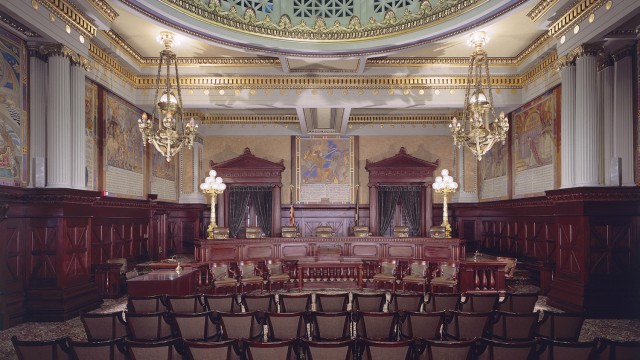
In the run-up to this week’s elections, quite a bit of money was handed out, especially for an off-off year with extremely low voter turnout. In fact, Pennsylvania’s judicial elections broke records for any state Supreme Court race in US history, with more than $16.5 million spent on advertising and campaigning. In addition to what the candidates raised and spent, a number of interest groups, including Pennsylvanians for Judicial Reform and the Committee for a Better Tomorrow, which supported Democrats, as well as the Republican State Leadership Committee, played central roles in the race.
“These negative ads, if anything, just serve to make people more cynical about the system and even suppress their voting,” says Lynn Marks, executive director of Pennsylvanians for Modern Courts, a nonpartisan group that opposes judicial elections. “Our system of justice is premised on impartiality and that all citizens stand equal before the law. It’s extremely hard to argue that people’s perception of such a system is not tarnished when judges can accept money from people and firms that come before them.”
This Supreme Court election was a big one for Pennsylvania: Three of the seven seats on the Supreme Court were up for election, and the results — Democrats won all of them — will determine the ideological bent of the court for a decade. It was also the first judicial election in Pennsylvania since 2010’s Citizens United decision.
Tuesday’s election followed a series of scandals that had made the Pennsylvania Supreme Court something of a joke. Joan Orie Melvin, a Republican justice, was convicted of corruption charges related to her 2009 campaign and sentenced to three years of house arrest. Another justice, Democrat Seamus McCaffery, resigned after he was caught using state computers to send pornographic email back and forth with staff in former Republican Governor Tom Corbett’s office. A third justice, Republican Ronald Castille, retired at the end of last year, but not before campaigning for McCaffery to resign. McCaffery, in turn, allegedly tried to coerce yet another Supreme Court justice, J. Michael Eakin, to come to his defense. But Eakin, investigators now allege, also was swapping racist, pornographic and otherwise offensive emails.
“They’re caught in this system,” Lynn Marks says of the judges. “If you want to win, you have to wage a statewide campaign. And unless you’re independently wealthy, you need money.”
It’s “troubling,” Matt Menendez, counsel at the Brennan Center, said in a statement, “that this unacceptable level of politicization is becoming the norm for judicial elections, rather than an exception. Something has to change.”
Numerous polls have found that an overwhelming majority of Americans think campaign contributions to judges affect how they rule from the bench. That majority isn’t necessarily wrong. A 2013 study by the American Constitution Society found that the more contributions justices receive from business interests, the more likely they are to rule in favor of businesses that come before the court.
Another result of all this special interest money, and the attack ads for which it pays, is that it can skew the outcome of criminal cases. A 2014 study by the American Constitution Society found that “State supreme court justices, already the targets of sensationalist ads labeling them ‘soft on crime,’ are under increasing pressure to allow electoral politics to influence their decisions, even when fundamental rights are at stake.”
The report’s authors write:
The more TV ads aired during state supreme court judicial elections in a state, the less likely justices are to vote in favor of criminal defendants. As the number of airings increases, the marginal effect of an increase in TV ads grows. In a state with 10,000 ads, a doubling of airings is associated on average with an 8 percent increase in justices’ voting against a criminal defendant’s appeal.
For Pennsylvania, the silver lining is that this election was so nasty, change might be on its way. As attack ads flooded the airwaves in October, Pennsylvania’s House Judiciary Committee endorsed an amendment to the state’s constitution that would replace judicial elections for the appellate courts (of which the Supreme Court is the highest) with merit appointments by the governor based on nominations by a non-partisan panel. (After four years on the job, judges would then have to campaign for a ten-year term.)
The fact that Democrats, backed by trial lawyers and unions, won this year’s Supreme Court election, despite a last-minute ad blitz by out-of-state Republican groups, could speed the legislation’s journey through Pennsylvania’s Republican-controlled legislature. Marks thinks it’s an encouraging sign that both parties seem to recognize the need for reform.
Meanwhile, a number of states are ramping up for their 2016 high court elections, including historically contentious Wisconsin and North Carolina. As next November approaches, voters in those states may want to keep their TV sets on “mute.”



